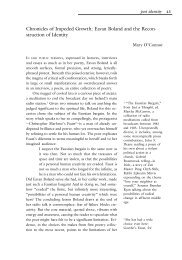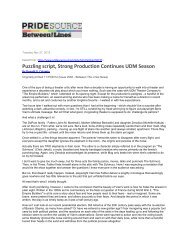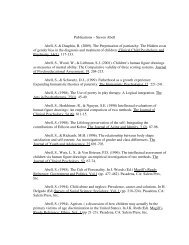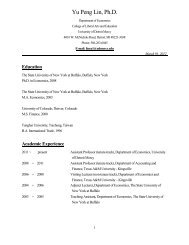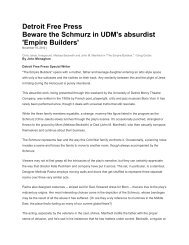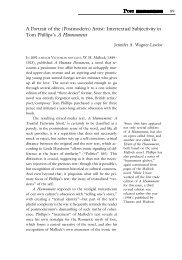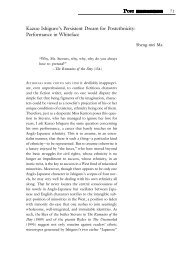Conquest, Conversion, and the Hybrid Self in Cabeza de Vaca's ...
Conquest, Conversion, and the Hybrid Self in Cabeza de Vaca's ...
Conquest, Conversion, and the Hybrid Self in Cabeza de Vaca's ...
Create successful ePaper yourself
Turn your PDF publications into a flip-book with our unique Google optimized e-Paper software.
124 POST OST IDENTITY<br />
IDENTITY<br />
2 For <strong>the</strong> best overview of<br />
<strong>the</strong> hybridity scholarship,<br />
see Juan Bruce-Novoa. He<br />
expla<strong>in</strong>s that “some critics<br />
affirm <strong>the</strong> experience from<br />
a romantic po<strong>in</strong>t of view—<br />
that is, <strong>the</strong> re<strong>in</strong>tegration<br />
of civilized man with<br />
nature—while o<strong>the</strong>rs<br />
un<strong>de</strong>rscore <strong>the</strong> conflict <strong>the</strong><br />
imputed conversion<br />
caused for ANCdV [Álvar<br />
Núñez <strong>Cabeza</strong> <strong>de</strong> Vaca]<br />
when he returned to<br />
civilization” (9). For<br />
Bruce-Novoa, this<br />
problem of re<strong>in</strong>tegration<br />
misses <strong>the</strong> po<strong>in</strong>t of <strong>the</strong><br />
narrative; we should,<br />
<strong>in</strong>stead, th<strong>in</strong>k of <strong>Cabeza</strong><br />
<strong>de</strong> Vaca as a forerunner of<br />
<strong>the</strong> mo<strong>de</strong>rn-day Chicano/<br />
a who lies <strong>in</strong> <strong>the</strong> middle of<br />
two cultures <strong>and</strong> does not<br />
fit neatly <strong>in</strong>to a b<strong>in</strong>ary<br />
system of relations (18–9).<br />
As such, <strong>Cabeza</strong> <strong>de</strong> Vaca’s<br />
narrative should be read as<br />
a “found<strong>in</strong>g as well as a<br />
fundamental text of<br />
Chicano literature <strong>and</strong><br />
colonial power, has compell<strong>in</strong>g implications for <strong>the</strong> relationship<br />
between European explorers <strong>and</strong> Native Americans<br />
<strong>in</strong> <strong>Cabeza</strong> <strong>de</strong> Vaca’s 1542 discovery narrative La<br />
Relación. Several scholars have commented on <strong>Cabeza</strong> <strong>de</strong><br />
Vaca’s hybridity—<strong>the</strong> collision between his Spanish heritage<br />
<strong>and</strong> his acquisition of Native American culture—but<br />
none has discussed it <strong>in</strong> terms of <strong>the</strong> exercise of colonial<br />
power <strong>and</strong> its resultant ambiguities. Some critics focus on<br />
<strong>Cabeza</strong> <strong>de</strong> Vaca’s relative skills <strong>in</strong> re<strong>in</strong>tegrat<strong>in</strong>g <strong>in</strong>to European<br />
culture after com<strong>in</strong>g <strong>in</strong> contact with Native Americans<br />
<strong>and</strong> un<strong>de</strong>rgo<strong>in</strong>g a series of i<strong>de</strong>ntity shifts from discoverer<br />
to ethnographer <strong>and</strong> f<strong>in</strong>ally to quasi-missionary. O<strong>the</strong>rs<br />
discuss <strong>Cabeza</strong> <strong>de</strong> Vaca as a prototype for <strong>the</strong> mo<strong>de</strong>rnday<br />
Chicano <strong>and</strong> make broad connections between <strong>the</strong><br />
Spanish discovery narrative <strong>and</strong> <strong>the</strong> emergence of a national<br />
American literary tradition. 2 My goal is to <strong>in</strong>terrogate<br />
<strong>the</strong> relationship between colonizer <strong>and</strong> colonized <strong>in</strong><br />
one specific colonial project <strong>and</strong> to un<strong>de</strong>rst<strong>and</strong> how an<br />
“outsi<strong>de</strong>r” <strong>and</strong> an “<strong>in</strong>si<strong>de</strong>r” can reta<strong>in</strong> his conqueror’s<br />
mentality yet simultaneously become more sympa<strong>the</strong>tic to<br />
native customs, how an “Indianized” Spaniard can both<br />
recognize <strong>the</strong> problems <strong>in</strong>herent <strong>in</strong> <strong>the</strong> concept of “discovery,”<br />
but still wish to colonize <strong>the</strong> natives.<br />
<strong>Cabeza</strong> <strong>de</strong> Vaca’s numerous i<strong>de</strong>ntity shifts from conquistador<br />
to captive to missionary <strong>and</strong> his transformation<br />
<strong>in</strong>to “Indianized Spaniard” take place over a wi<strong>de</strong> terra<strong>in</strong><br />
<strong>in</strong> <strong>the</strong> New World. Many attempts have been ma<strong>de</strong> to<br />
un<strong>de</strong>rst<strong>and</strong> <strong>the</strong> precise geographical locations of <strong>Cabeza</strong><br />
<strong>de</strong> Vaca dur<strong>in</strong>g his expedition <strong>and</strong> to p<strong>in</strong>po<strong>in</strong>t <strong>the</strong> actual<br />
native groups with whom he came <strong>in</strong> contact, but thus far<br />
we can only be certa<strong>in</strong> about <strong>the</strong> general contours of <strong>the</strong><br />
story. Álvar Núñez <strong>Cabeza</strong> <strong>de</strong> Vaca was appo<strong>in</strong>ted treasurer<br />
on a Spanish expedition <strong>de</strong>signed to colonize <strong>the</strong><br />
region along <strong>the</strong> Gulf of Mexico <strong>in</strong> 1527. Hostilities with<br />
native populations <strong>and</strong> a shortage of food forced <strong>the</strong> group<br />
to retreat from <strong>the</strong> coast of Florida; dur<strong>in</strong>g <strong>the</strong> retreat,<br />
various storms caused <strong>Cabeza</strong> <strong>de</strong> Vaca <strong>and</strong> his small party<br />
to be separated from <strong>the</strong> rest of <strong>the</strong> Spaniards <strong>and</strong> eventually<br />
this small group ma<strong>de</strong> <strong>the</strong>ir way <strong>in</strong>to mo<strong>de</strong>rn-day Texas.<br />
Dur<strong>in</strong>g this period, <strong>Cabeza</strong> <strong>de</strong> Vaca lived as a captive with<br />
various native tribes for several years until f<strong>in</strong>ally escap<strong>in</strong>g<br />
Alan J. Silva




